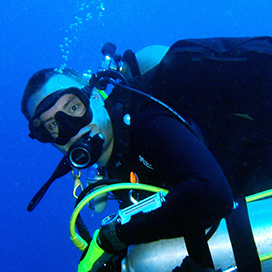
St. Mary’s scenic waterfront campus gives biology majors a variety of opportunities to explore nature. The Chesapeake Bay, fresh water ponds, wooded areas, and an assortment of wildlife including classrooms, labs, and high-tech equipment are available for your research projects. You will work closely with faculty on various research projects both on and off of campus many of which lead to publications or conference presentations.
St. Mary’s Undergraduate Research Fellowship (SURF)
SURF is an eight-week annual summer program at St. Mary’s, where students from a variety of disciplines delve into research topics of their own aspirations with guidance from faculty mentors and a stipend.
Learn more about Research Opportunities
Faculty Research Summaries
Our faculty are practicing scholars and maintain active research laboratories. If you are interested in a particular faculty member’s research you should discuss possible opportunities with them directly.
2019-2020 Academic Year
Jeffrey Byrd jjbyrd@smcm.edu SH 216, ext. 2973
My research interests: microbial ecology, survival of bacteria in the environment, and novel antimicrobial agents. My two ongoing study areas: 1) the predatory interactions of non-obligate predatory soil bacteria and 2) the survival of bacteria in the estuarine environment Bacterial genera commonly studied in my laboratory are Escherichia, Vibrio, Aristabacter, Cupriavidus, Ensifer, and Agromyces
Karen Crawford kcrawford@smcm.edu SH 262, ext. 4598
My research interests involve questions concerning how normal pattern is created in regenerating and developing systems. Projects in my research lab include studying the cellular and molecular mechanisms that function during amphibian limb regeneration and metamorphosis, squid embryogenesis, and regeneration in a fresh water oligochaete worm.
Kevin Emerson kjemerson@smcm.edu SH231, ext. 2123
My research primarily focuses on understanding evolutionary processes in natural systems. In particular I have research efforts in understanding how organisms survive in seasonal environments, how evolutionary processes have and will affect malaria transmission dynamics, and how organisms interact with intracellular symbionts. Molecular, Evolutionary, and ecological contexts drive my research. Research opportunities in my lab range from the field (collection, identification, monitoring) to the lab (molecular genetics) to the computer (computational biology including the analysis of large sequence datasets).
Rachel Myerowitz rmyerowitz@smcm.edu SH260, ext. 4373
In general, I study human inherited disorders which result from a defective lysosomal enzyme and therefore affect lysosomal function. The focus of my research includes the molecular genetics, molecular pathological mechanisms, gene expression profiles and treatment development for Tay-Sachs, Gaucher and Pompe Diseases, three inherited lysosomal disorders. In addition, I am interested in bioethical questions mainly concerned with ethical dilemmas raised by the new biotechnology and I have mentored many SMPs focused on such questions. I am also interested in utilizing plants as my experimental system for asking genetic questions. I am currently mentoring an SMP which asks the question of whether or not a nursery ground for an extinct shark, C. megalodon, existed in the Chesapeake area 15 million years ago-take home message- come speak with me about any interesting question you would like to explore!
Jordan Price jjprice@smcm.edu SH 212, ext. 2216
My research blends two disparate fields of biology, animal behavior and molecular evolution, to investigate the evolutionary histories of animal traits, especially the songs and color patterns of birds. But I am broadly interested in topics spanning these and other biological fields. Previous SMP students have studied the behaviors of a variety of local animals (including deer, insects, isopods, and a wide diversity of birds), as well as other non-local taxa from the New World tropics. Some studies have used molecular phylogenies to examine how and why animal characteristics have evolved into the forms we see today. You can browse some of my recent papers, including a few co-authored with students, posted on my lab bulletin board. Current projects that students could jump right into include: the evolution of sexual dimorphism, song evolution in mockingbirds and relatives, the evolution of nest structures in Australian and African birds.. But I’d be happy to talk about any ideas you might have.
The rest to come soon!

